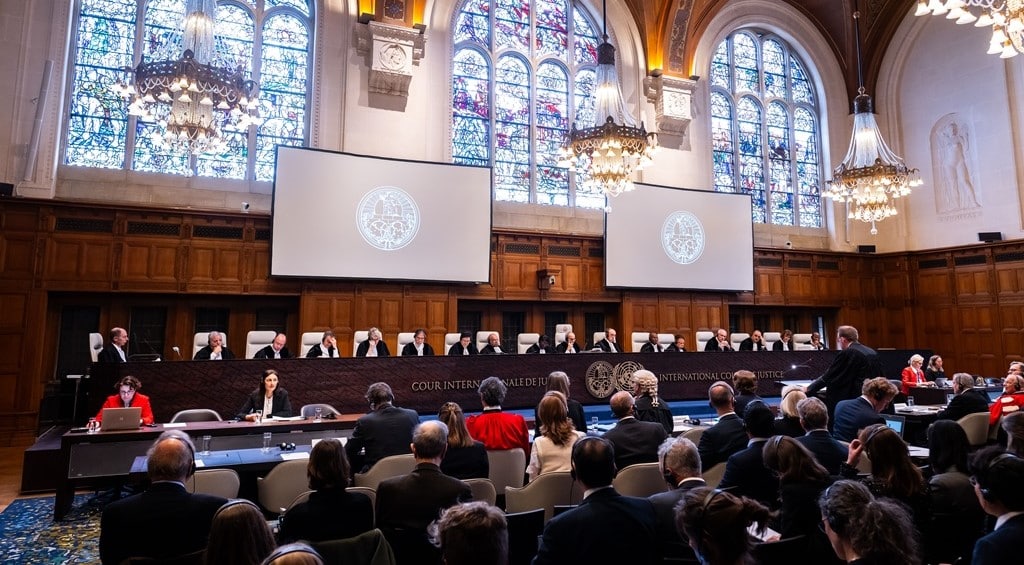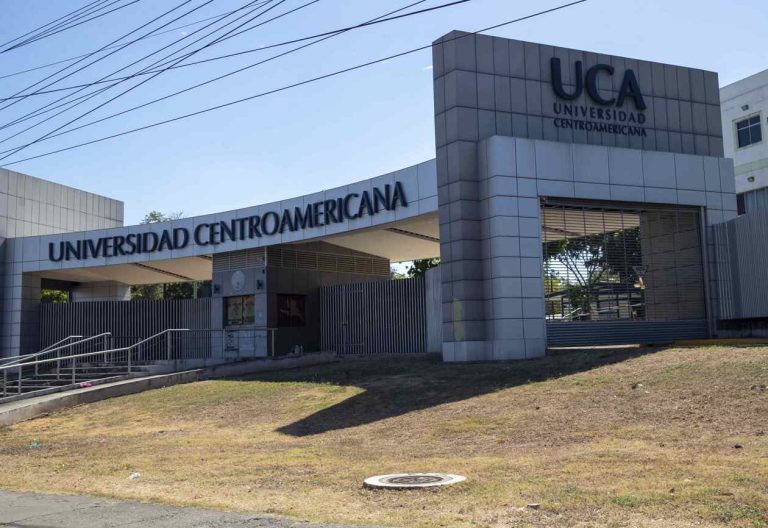11 de agosto 2023

ICJ Rules Against Nicaragua's Request For Germany to Halt Arms Sales to Israel

PUBLICIDAD 1M
PUBLICIDAD 4D
PUBLICIDAD 5D
The Central American University (UCA) sheltered the victims of government repression in 2018 and became a bastion of political freedoms

The regime of Daniel Ortega and Rosario Murillo has frozen the bank accounts of the Central American University (UCA) sources close to the educational center confirmed to Confidencial. Meanwhile, a government source told the “Divergentes” news site that the measure also extended to “some of their highest Board members.”
At present, it’s not known if these measures are tied to a police investigation of the university to justify the freezing of their accounts. The UCA has yet to offer a formal statement on the repressive measure exercised against it.
On Wednesday, August 9, the university sent an e-mail to students and to their service providers and offices to inform that: “due to inconveniences beyond our control in our means and channels of payment, we are not receiving payments for tuition or services in any of the offices related to the University.” They promised to send a new notification as soon as the problem had been resolved, without any more details.
The Divergentes report quoted a source tied to the UCA affirming that the university, “reported internal, organizational and financial movements to reduce the impact of an eventual measure such as the current freezing of their accounts.”
The UCA, a Jesuit University founded in 1960, is one of 13 universities waiting for the government-controlled National Council of Evaluation and Accreditation to finalize their evaluation process, in order to be accredited. This latter body, together with the government-run National Council of Universities, has become the regime’s repressive arm against private institutions of higher education.
The Ortega regime began closing private universities and confiscating their facilities and assets in 2021, initially via massive closures of the legal non-profit status of organizations previously approved by the Interior Ministry. Since December 2022, however, they began justifying these closures with the allegation that the academic offerings of these educational centers failed to comply with the country’s minimum standards of quality.
The National Council of Education and Accreditation is the chief body in charge of the process of university accreditation. This entity has “decapitated” at least ten educational institutions, basing their dictates on a 2022 reform to Law #740: Creation of a National System for Assuring Educational Quality and the Regulation of the National Council for Evaluation and Accreditation.
According to the Divergentes report, the accreditation process that the UCA has been mired in has made it impossible for the board to stay current in its transactions with a number of entities, including the banks. “Since this updating of information hasn’t taken place, the regime is now pressuring the Superintendence of Banks and other Financial Institutions to close their accounts for failures in financial administration,” a source told the Divergentes media team.
In April 2022, the Sandinista deputies in Nicaragua’s National Assembly reformed the General Education Law and the Law for the Autonomy of the Institutes of Higher Education. In doing so, they left the UCA out of a Constitutional arrangement whereby 6% of the national budget is earmarked for the universities. This cutoff in government assistance affected the UCAs ability to maintain their scholarship programs, affecting thousands of youth from all over the country.
Educational experts saw the measure as government reprisal against the first private university ever established in Central America. The Nicaraguan campus of UCA, based in Managua, was founded by the Company of Jesus in 1960. In 2018, during the social explosion of 2018, it became a bastion of the struggle against the Ortega regime. Its campus was a sanctuary for the exercise of free expression on the part of its students, some of whom later became objects of the regime’s political persecution.
On May 30, 2018, the UCA also opened its doors to shelter hundreds of Nicaraguans who had been participating in the Mothers’ Day March, which was attacked by police and paramilitary at the service of the regime, using live ammunition. The attack left many deaths and much grief in its wake.
The area around the university campus has remained under constant watch from police patrols, with the objective of avoiding any act of resistance and protest on the part of the UCA educational community.
The Ortega regime forced the de facto banishment of the former UCA rector, Jesuit priest Jose Alberto Idiaquez Guevara, who had served in that post since 2014. After leaving Nicaragua temporarily for health reasons, in July 2022 Father Idiaquez was prevented from returning to the country, when the dictatorship refused to renew his passport.
Idiaquez had been a member of the Civic Alliance and participated in the first attempt at a National Dialogue after the Ortega regime’s violent crackdown of the April Rebellion. The Dialogue had been moderated by the Nicaraguan Episcopal Conference. Idiaquez later left the Civic Alliance, when the opposition organization abandoned the National Coalition in favor of seeking their own candidate to the 2021 elections.
In September 2022, the Ortega regime also refused reentry to the University’s assistant rector, Jorge Huete, who had been on a working trip to Cordoba, Argentina. Since June 1, 2022, Father Rolando Enrique Alvarado Lopez has served as the institution’s rector.
This article was originally published in Spanish in Confidencial and translated by Havana Times.
PUBLICIDAD 3M
Confidencial es un diario digital nicaragüense, de formato multimedia, fundado por Carlos F. Chamorro en junio de 1996. Inició como un semanario impreso y hoy es un medio de referencia regional con información, análisis, entrevistas, perfiles, reportajes e investigaciones sobre Nicaragua, informando desde el exilio por la persecución política de la dictadura de Daniel Ortega y Rosario Murillo.
PUBLICIDAD 3D